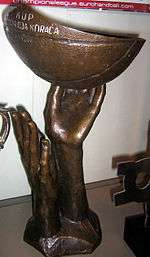Radivoj Korać
.jpg) | ||||||||||||||||||||||||||||||||||
| Personal information | ||||||||||||||||||||||||||||||||||
|---|---|---|---|---|---|---|---|---|---|---|---|---|---|---|---|---|---|---|---|---|---|---|---|---|---|---|---|---|---|---|---|---|---|---|
| Born |
5 November 1938 Sombor, Kingdom of Yugoslavia | |||||||||||||||||||||||||||||||||
| Died |
2 June 1969 (aged 30) Sarajevo, SR Bosnia and Herzegovina, SFR Yugoslavia | |||||||||||||||||||||||||||||||||
| Nationality | Serbian | |||||||||||||||||||||||||||||||||
| Listed height | 6 ft 5 in (1.96 m) | |||||||||||||||||||||||||||||||||
| Listed weight | 207 lb (94 kg) | |||||||||||||||||||||||||||||||||
| Career information | ||||||||||||||||||||||||||||||||||
| NBA draft | 1960 / Undrafted | |||||||||||||||||||||||||||||||||
| Playing career | 1954–1969 | |||||||||||||||||||||||||||||||||
| Position | Power forward | |||||||||||||||||||||||||||||||||
| Number | 5, 14 | |||||||||||||||||||||||||||||||||
| Career history | ||||||||||||||||||||||||||||||||||
| 1954–1967 | OKK Beograd | |||||||||||||||||||||||||||||||||
| 1967–1968 | Standard Liège | |||||||||||||||||||||||||||||||||
| 1968–1969 | Petrarca Padova | |||||||||||||||||||||||||||||||||
| Career highlights and awards | ||||||||||||||||||||||||||||||||||
| ||||||||||||||||||||||||||||||||||
| FIBA Hall of Fame as player | ||||||||||||||||||||||||||||||||||
|
Medals
| ||||||||||||||||||||||||||||||||||

Radivoj Korać (Serbian Cyrillic: Радивој Кораћ), sometimes also Radivoje, (5 November 1938 – 2 June 1969) was a Serbian professional basketball player. Korać is well known for holding the EuroLeague's all-time single-game scoring record, at 99 points scored, in a game versus Alvik Basket, during the 1964–65 season,[1] and for once making 100 out of 100 free throws on a live television show in Belgium.[2]
Korać died in a car crash in 1969, at the age of 30, and FIBA Europe later established the European third-tier Radivoj Korać Cup in his remembrance, in 1971. Korać was named one of FIBA's 50 Greatest Players in 1991. In 2002, the Basketball Federation of Serbia named its top national cup competition, the Radivoj Korać Cup, after him. He was enshrined into the FIBA Hall of Fame in 2007 and was named one of the 50 Greatest EuroLeague Contributors the following year.
Club career
Korać was born in Sombor, in the Kingdom of Yugoslavia. He started playing for OKK Beograd, at the age of 16, and played as a left-handed forward-center. Popularly nicknamed, Žućko ('Ginger'), he became one of the best, if not the best, player of the Yugoslav League in the 1960s. In 1960, Korać was named The Best Athlete of Yugoslavia, and Yugoslav Sportsman of the Year. He was the best scorer of the Yugoslav League for seven seasons, which is a record, and he had a career scoring average in the Yugoslav league of 32.7 points per game.[3]
He reached various European champions' competitions with OKK Beograd. Korać was named a part of the best European selection in both 1964 and 1965. In a two-game playoff series against Swedish League champions Alvik Basket, during the 1964–65 season of the FIBA European Champions Cup (Euroleague), he scored 170 points. He scored 71 points in the first game of the series, and 99 points in the second game of the series, for a series scoring average of 85 points per game.[4]
Yugoslav national team
Korać entered into the Yugoslavian national basketball team in 1958, and went on to win five silver medals, and one bronze medal with them, in a total of 157 international games. He was the EuroBasket's Top Scorer 3 times (1959, 1961, and, 1963), and was named the MVP of EuroBasket 1961.
He won the silver medal at both the 1963 FIBA World Championship and the 1967 FIBA World Championship. He was the Top Scorer of the 1960 Summer Olympic Games.[5] He won the silver medal at the 1968 Summer Olympic Games. With Yugolsavia's senior men's national team, he had 157 caps and scored 3,153 points, for a scoring average of 20.1 points per game.[6]
Personal
Away from the basketball court, Korać enjoyed theatre, music, and reading books. He was a senior undergraduate, from the Faculty of Electrical Engineering (ETF), at the University of Belgrade. Surprisingly, he once turned down a contract offer to play with Red Star Belgrade.
Death and legacy
On Monday 2 June 1969, Korać died in a car crash just outside of Sarajevo, on the road between Vogošća and Semizovac. The Yugoslav Basketball Federation decided that no basketball games would be played in Yugoslavia on the 2nd of June again.
In 1971, FIBA Europe established the Radivoj Korać Cup. After the third-tier European-wide Cup folded in the year 2002, the basketball federation of Serbia and Montenegro renamed its national cup competition to Kup Radivoja Koraća, a name it still carries today in Serbia.
See also
References
- ↑ Radivoj Korac's 99 points.
- ↑ Сећање на легендарног стрелца (The memory of the legendary shooter (English)), RTS, June 1, 2009 (Serbian).
- ↑ РАДИВОЈЕ КОРАЋ - ЖУЋКО (Serbian).
- ↑ Euroleague.net Radivoj Korac's 99 points.
- ↑ FIBA.com 1960 Olympic Games: Tournament For Men.
- ↑ Сећање на легендарног стрелца (The memory of the legendary shooter (English)), RTS, June 1, 2009 (Serbian).
External links
- OKKBelgrade Hall Of Fame - Official Web Site of OKKBelgrade*
- FIBA Hall Of Fame Page On Korać
- Euroleague.net 50 Greatest Contributors
- FIBAEurope.com Profile
- Сећање на легендарног стрелца (The memory of the legendary shooter (English)), RTS, June 1, 2009 (Serbian)